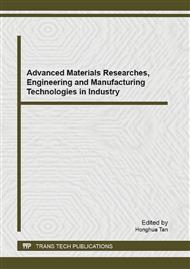p.947
p.954
p.959
p.965
p.973
p.978
p.982
p.987
p.991
Rescheduling Problems with Deteriorating Jobs to Minimize the Tardiness Costs under Time Disruptions
Abstract:
This paper studies the issue of rescheduling to allow for the unexpected arrival of new jobs, taking into account the effect of the disruptions on a previously planned optimal schedule. We consider the single-machine rescheduling problems with deteriorating jobs. Rescheduling means that a set of original jobs has already been scheduled to minimize some classical objective, then a new set of jobs arrives and creates a disruption. The objective is to minimize the total tardiness costs under a limit of the disruptions from the original scheduling. We propose polynomial time algorithms or some dynamic programming algorithms for each problem.
Info:
Periodical:
Pages:
973-977
DOI:
Citation:
Online since:
September 2013
Authors:
Price:
Сopyright:
© 2013 Trans Tech Publications Ltd. All Rights Reserved
Share:
Citation:


